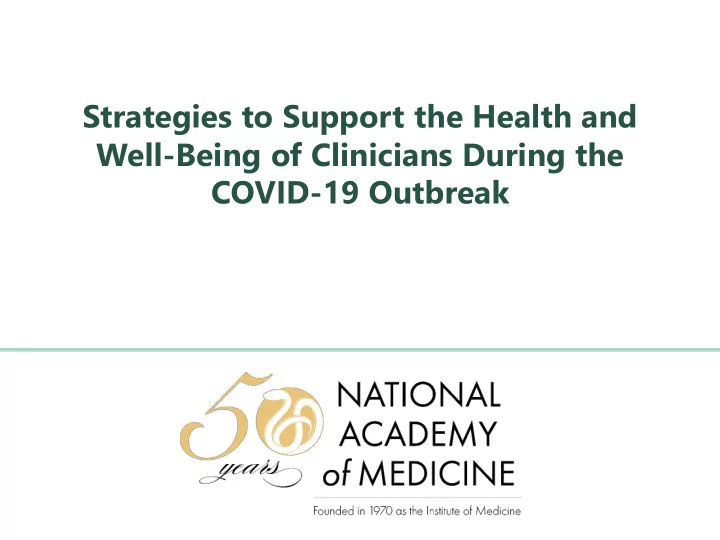

Strategies to Support the Health and Well-Being of Clinicians During the COVID-19 Outbreak
Supporting Clinician Well-Being During COVID-19 The National Academy of Medicine’s Action Collaborative on • Clinician Well-Being and Resilience remains wholly committed to reversing trends in clinician burnout, and must acknowledge the toll that the current COVID-19 crisis is taking on the well-being of clinicians. Even before the COVID-19 outbreak, many clinicians already • faced burnout, as well as stress, anxiety, depression, substance abuse, and even suicidality. @theNAMedicine #ClinicianWellBeing
Supporting Clinician Well-Being During COVID-19 Now this global public health emergency is presenting • clinicians with even greater workplace hardships and moral dilemmas that are very likely to exacerbate existing levels of burnout and related mental health problems. During this challenging time, we should aspire to follow clear • strategies, both as health care leaders and as individual clinicians, to help sustain the well-being of clinicians amidst the COVID-19 outbreak. @theNAMedicine #ClinicianWellBeing
Strategies for Health Care Leaders and Managers 1. Value clinicians : Provide clear messages that clinicians are valued. 2. Communicate best practices : Communicate best practices clearly and compassionately. Manage expectations, create work schedules that promote resilience, ensure appropriate working hours with breaks, emphasize the importance of self- care, provide sufficient resources (masks, gloves, goggles, gowns, hand sanitizer, soap and water, cleaning supplies, healthy snacks, easy access to water, chargers for phones, etc.), and provide effective personal protective equipment. @theNAMedicine #ClinicianWellBeing
Strategies for Health Care Leaders and Managers 3. Monitor and promote clinician well-being : Monitor the well- being of your clinicians proactively; identify mental health professionals and counseling options available to support them. Provide appropriate measures for personal safety, and address concerns related to clinicians’ safety and the safety of their families. 4. Provide a supportive and blame-free work culture : Implement a psychologically safe environment for clinicians to openly discuss vulnerability, stress, burnout, and other barriers to their well-being. Encourage clinicians to report incidents, such as exposures to blood or bodily fluids from the respiratory system or to cases of violence, and to adopt measures for immediate follow-up, including support to victims. @theNAMedicine #ClinicianWellBeing
Strategies for Health Care Leaders and Managers 5. Enable cooperation and collaboration : Institute mechanisms for cooperation and collaboration between management, clinical teams, and clinicians. 6. Provide a central access point for updated information, technical updates, and tools to address COVID-19 : Familiarize personnel with technical updates on COVID-19 and provide appropriate tools to assess, triage, test, and treat patients and to share infection prevention and control information with patients and the public. @theNAMedicine #ClinicianWellBeing
Strategies for Health Care Leaders and Managers 7. Ensure clinicians are not required to return to work during dire situations : Clinicians should not be required to return to a work situation where there is continuing or serious danger to life or health, until the employer has taken any necessary remedial action. 8. Provide appropriate resources if clinicians are infected with COVID-19 : Honor the right to compensation, rehabilitation, and curative services if clinicians are infected with COVID-19 following exposure in the workplace. @theNAMedicine #ClinicianWellBeing
Strategies for Clinicians 1. Meet basic needs : Eat, drink, sleep, and exercise regularly. Becoming biologically deprived is risky and may compromise your ability to care for patients. 2. Take breaks : Whenever possible, give yourself a rest from patient care with comforting, fun, or relaxing activities. Take walks, listen to music, read a book, write in a journal, practice breathing and relaxation techniques, or talk with friends. Taking appropriate rest leads to proper care of patients after your break. @theNAMedicine #ClinicianWellBeing
Strategies for Clinicians 3. Stay connected : Give and receive support from your colleagues to avoid isolation, fear, and anxiety. Partner with colleagues to support each other and monitor each other’s stress, workload, and safety. Communicate with colleagues clearly and optimistically. Contact family and loved ones for support. 4. Respect differences : Recognize and respect differences in yourself, your patients, and your colleagues, such as needing to talk versus needing to be alone. @theNAMedicine #ClinicianWellBeing
Strategies for Clinicians 5. Stay updated : Rely on trusted sources of information and participate in meetings where relevant information is provided. However, avoid watching or listening to news reports 24/7. Graphic imagery and worrisome messages can increase your stress and may reduce your effectiveness and overall well-being. 6. Perform self check-ins : Monitor yourself over time for any symptoms of depression or stress, such as prolonged sadness, difficulty sleeping, intrusive memories, and/or hopelessness. Talk to a peer or supervisor, advise management so that they can provide support interventions, or seek professional help. @theNAMedicine #ClinicianWellBeing
Strategies for Clinicians 7. Honor your service : Remind yourself and others of the important and noble work you are doing. Recognize colleagues for their service whenever possible. These strategies are adapted from several resources to promote clinician well-being during COVID-19. They are not exhaustive. @theNAMedicine #ClinicianWellBeing
Additional Information More Clinician Well-Being during COVID-19 resources: • bit.ly/CWCOVID19 More COVID-19 resources: nam.edu/coronavirus • More Clinician Well-Being resources: • nam.edu/CW Social media: @theNAMedicine • @theNAMedicine #ClinicianWellBeing
Recommend
More recommend